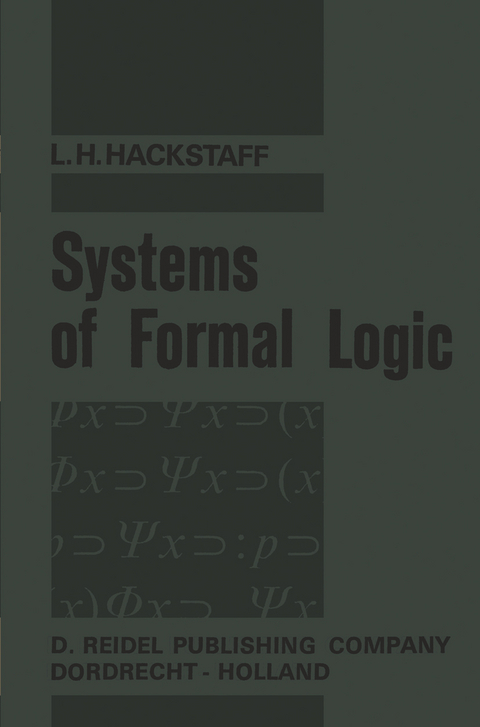
Systems of Formal Logic
Springer (Verlag)
978-94-010-3549-1 (ISBN)
1 Introduction: Some Concepts and Definitions.- 1.0 Arguments and Argument Forms.- 1.1 Symbolic Logic and its Precursors.- 1.2 Symbolization.- 1.3 Logical Functors and Their Definitions.- 1.4 Tests of Validity Using Truth-tables.- 1.5 Proof and Derivation.- 1.6 The Axiomatic Method.- 1.7 Interpreted and Uninterpreted Systems.- 1.8 The Hierarchy of Logical Systems.- 1.9 The Systems of the Present Book.- 1.10 Abbreviations.- 2 The System P+.- 2.1 Summary.- 2.2 Rules of Formation of P+.- 2.3 Rules of Transformation of P+.- 2.4 Axioms of P+.- 2.5 Definitions of P+.- 2.6 Deductions in P+.- 3 Standard Systems with Negation (PLT, PLT’, PLTF, PPM).- 3.1 Summary.- 3.2 Rules of Formation of PLT.- 3.3 Rules of Transformation of PLT.- 3.4 Axioms of PLT.- 3.5 Definitions of PLT.- 3.6 Deductions in PLT.- 3.7 The Deduction Theorem.- 3.8 The System PLT’.- 3.9 Independence of Functors and Axioms.- 4 The System PND. Systems of Natural Deduction.- 4.1 Summary.- 4.2 The Bases of the System PND.- 4.3 Proof and Derivation Techniques in PND.- 4.4 Rules of Formation of PND.- 4.5 The Structure of Proofs in PND.- 4.6 Rules of Transformation of PND.- 4.7 Proofs and Theorems of the System PND.- 4.8 Theorems of the Full System PND.- 4.9 A Decision Procedure for the System PND.- 4.10 A Reduction of PND.- 5 The Consistency and Completeness of Formal Systems.- 5.1 Summary.- 5.2 The Consistency of PLT’.- 5.3 The Completeness of PLT’.- 5.4 Metatheorems on P+.- 6 Some Non-Standard Systems of Propositional Logic.- 6.1 Summary.- 6.2 What is a Non-Standard System?.- 6.3 The Intuitionistic System and the Fitch Calculus (PI and PF).- 6.4 Rules of Formation of PI.- 6.5 Rules of Transformation of PI.- 6.6 Axioms of PI.- 6.7 Definitions of PI.- 6.8 Deductions in PI.- 6.9 The Propositional Logic of F.B.Fitch.- 6.10 The Johansson Minimum Calculus.- 7 The Lower Functional Calculus.- 7.1 Summary and Remarks.- 7.2 Rules of Formation of LFLT’.- 7.3 Transformation of LFLT’.- 7.4 Axioms of LFLT’.- 7.5 Definitions of LFLT’.- 7.6 Some Applications and Illustrations.- 7.7 Rules of Transformation of LFLT’.- 7.8 Axioms of LFLT’.- 7.9 The Propositional Calculus and LFLT’.- 7.10 Deductions in LFLT’.- 8 An Extension of LFLT’ and Some Theorems of the Higher Functional System. The Calculus of Classes.- 8.1 Summary and Modification of the Formation Rules of LFLT’.- 8.2 The Lower Functional Calculus with Identity.- 8.3 Quantification over Predicate Variables. The System 2FLT’=.- 8.4 Abstraction and the Boolean Algebra.- 8.5 The Boolean Algebra and Propositional Logic.- 9 The Logical Paradoxes.- 9.1 Self Membership.- 9.2 The Russell Paradox.- 9.3 Order Distinctions, Levels of Language, and the Semantic Paradoxes.- 9.4 The Consistency of LFLT’.- 9.5 The Decision Problem.- 9.6 Consistency and Decision in Higher Functional Systems.- 10 Non-Standard Functional Systems.- 10.1 Summary.- 10.2 Intuitionistic and Johansson Functional Logics.- 10.3 The Fitch Functional Calculus of the First Order with Identity (LFFF=).
| Zusatzinfo | 372 p. |
|---|---|
| Verlagsort | Dordrecht |
| Sprache | englisch |
| Maße | 152 x 229 mm |
| Themenwelt | Geisteswissenschaften ► Philosophie ► Allgemeines / Lexika |
| Geisteswissenschaften ► Philosophie ► Logik | |
| ISBN-10 | 94-010-3549-0 / 9401035490 |
| ISBN-13 | 978-94-010-3549-1 / 9789401035491 |
| Zustand | Neuware |
| Haben Sie eine Frage zum Produkt? |
aus dem Bereich


